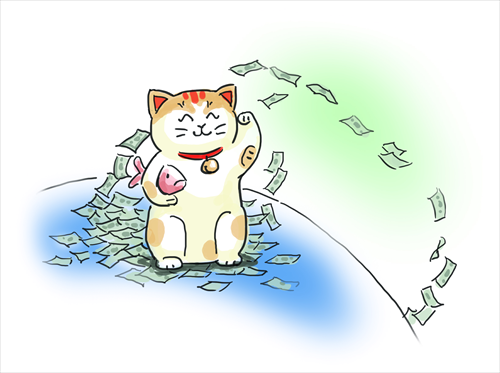


Illustration: Liu Rui/GT
The current Sino-Japanese relations can hardly escape two seemingly contradictory phenomena. Bilateral political and diplomatic ties have failed to reach a détente despite certain signs of abating. The deadlock surrounding Japan's understanding of history, maritime demarcation and territorial sovereignty remains as ever, with only a few issues laid up for the moment.
But in spite of increasingly hostile public sentiments, a growing number of the Chinese travel to Japan owing to the devaluation of the Japanese yen and its strategy to establish a tourism-based country. These two factors have led to the embarrassment of "cold politics and hot economics" against a lukewarm diplomatic background.
So with China-Japan ties still facing a number of constraints, what does this tourism boom, which began in October 2013, reflect? Will this phenomenon prompt China's manufacturing industry to make the necessary changes?
Tourism has been playing a significant role in stimulating the Japanese economy. According to statistics, international visitors to Japan hit 13.414 million in 2014 and more than 2 million of them were from the Chinese mainland. This was a whopping increase of 82.2 percent over the previous year. Meanwhile, consumption by overseas visitors in Japan also rose sharply, who spent some 2 trillion yen ($16.8 billion) in 2014. Tourists from the Chinese mainland spent 235,000 yen on average, topping the list of foreign spenders. The per capita spending of Chinese tourists amounted to 450,000 yen, with food and accommodation included, accounting for one quarter of the spending of foreign visitors there.
The Japan Tourism Agency has calculated that the spending of every 10 overseas tourists in Japan is almost equivalent to the domestic consumption of a local. Spending by foreign visitors has shored up Japan's sagging domestic demand in an aging society. Given the 20 trillion yen produced by Japan's tourism trade, which is more or less equal to the output of the country's financial and construction industries, the increasing number of foreign visitors is predicted to help power Abenomics.
The status quo of cold politics and hot tourism between China and Japan reflects that Chinese industries need to face up to the upgrading demands of their people.
In Japan, Chinese tourists are keen on buying everything from air purifiers, rice cookers, toilet lids, vacuum cups, hair driers and desserts to nail clippers. Various reports on the shopping spree have indicated the discontent of Chinese nationals with their country's extensive growth pattern that has led to a deteriorating environment and the gap between the two countries in air quality, food security, civility and social order. They also demonstrated that in an era when richer Chinese are becoming international tourists, they naturally desire for high-quality, durable and safe goods. But this reveals the Chinese public's lack of confidence in homemade products.
In light of such chronic conundrums as inferior quality and the challenges of economic slowdown and structural adjustment, Chinese industries should make every effort to produce high-quality and popular goods. After all, a world factory that fails to produce goods accepted and loved by its people will never dominate the global manufacturing industry.
While Japan is witnessing slumping investment in its trade with China due to cold politics, it still has earned the benefits of tourism. The country has not only benefited from economic interests brought about by the backflow of the high-end manufacturing industry but is also recognizing the benefit of Chinese preferences, which has triggered wide discussion and even envy among plenty of manufacturing enterprises in China.
Chinese firms should carefully ponder the numerous advantages of their Japanese counterparts, including their human-centered care, and elaborate processing techniques in development philosophy, research and development management and manufacturing.
Watching Chinese nationals who should be buying domestically homemade goods going on shopping sprees in other countries, Chinese enterprises should recognize the advantages of Japan's people-orientated approach. In front of the fierce competition from the Japanese industry, China's manufacturing firms have to improve every bit of the quality of their products to avoid Chinese outbound tourists coming back with excess luggage.
 PLA soldiers operating vehicle-mounted guns in drill
PLA soldiers operating vehicle-mounted guns in drill Beauties dancing on the rings
Beauties dancing on the rings Blind carpenter in E China's Jiangxi
Blind carpenter in E China's Jiangxi Top 10 highest-paid sports teams in the world
Top 10 highest-paid sports teams in the world In photos: China's WZ-10 armed helicopters
In photos: China's WZ-10 armed helicopters UFO spotted in several places in China
UFO spotted in several places in China Certificates of land title of Qing Dynasty and Republic of China
Certificates of land title of Qing Dynasty and Republic of China  Cute young Taoist priest in Beijing
Cute young Taoist priest in Beijing New film brings Doraemon's life story to China in 3D
New film brings Doraemon's life story to China in 3D China-S.Korea FTA sets positive precedent
China-S.Korea FTA sets positive precedent Ferry carrying 458 people sinks in Yangtze River
Ferry carrying 458 people sinks in Yangtze River Mecca of Marxism
Mecca of Marxism Bring them home
Bring them homeDay|Week